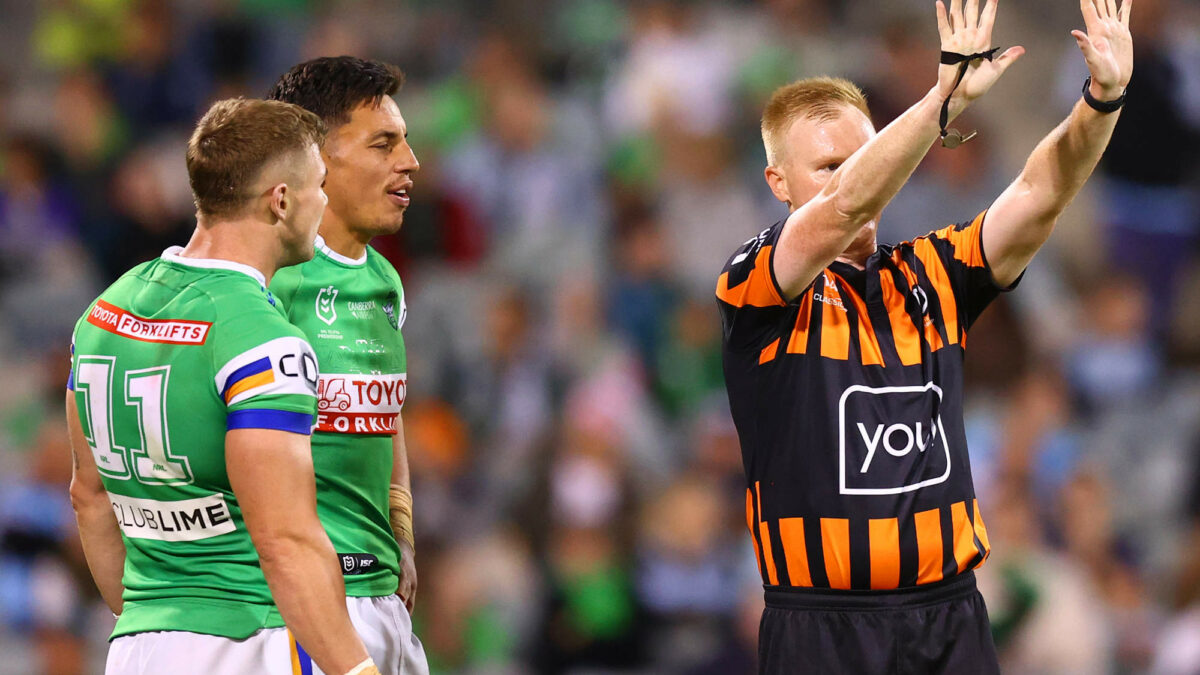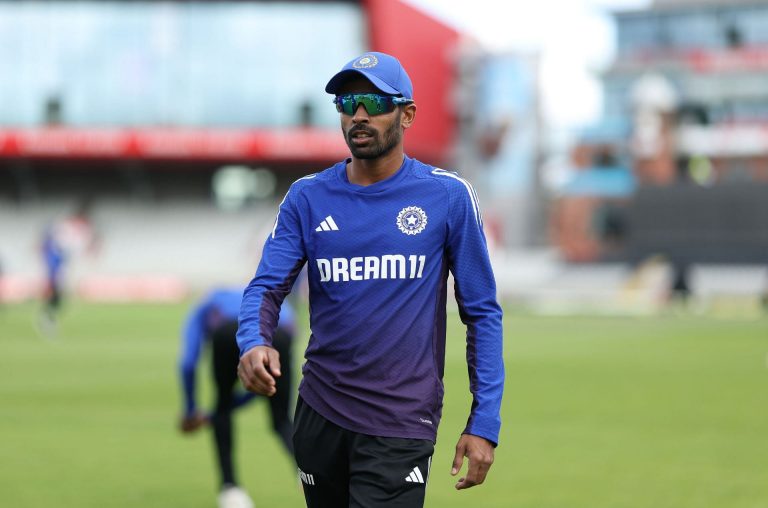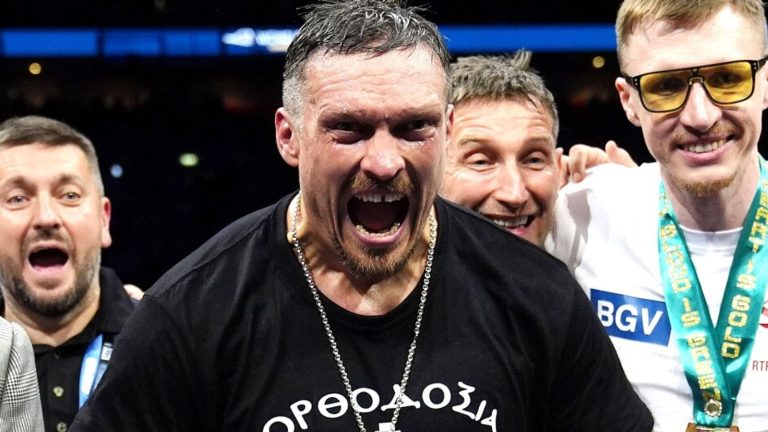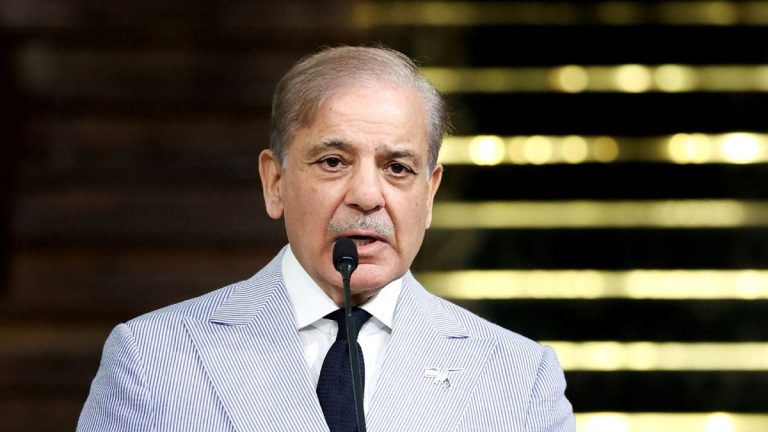Whilst the triumphant return of Mitchell Moses in the Eels Easter Monday win has grabbed the headlines, the enduring talking point has to be the state of officiating in one of the most head scratching and anger inducing clashes in recent memory.
The Tigers-Eels clash was Monday madness for all the wrong reasons, and Liam Kennedy was the ‘star’ of the show. If he wants to be the star, then he needs to be willing to face the press.
The tone was set early on for this game to spiral out of control. Terrell May was hit in the head by a shoulder in the first hit up of the game, play on, no penalty. On the Eels first foray down the Tigers end, a brush of the face resulted in a penalty goal.
Immediately within the first five minutes, it’s established that consistency will not be a theme of this match.
In the lead-up to the Eels’ first try, the Tigers place a kick, Josh Addo-Carr juggles the ball backwards, with no Tiger touch, delivering to a teammate who promptly drops the ball. A Tigers knock on is called, a few moments later Mitchel Moses kicks a 40-20, the Eels head down field and score.
To begin the second half a disgraceful non-hip drop call on Kelma Tuilagi, who having feigned injury, somehow received his own divine Easter resurrection to storm through the Tigers defence for the Eels third try the next set. Once more, an incorrect decision from Kennedy and the bunker, leading to points.
These calls, combined with an avalanche of set restarts, typically late in the count, was enough to create a storm on social media with pundits bewildered as to the treatment the Tigers were receiving, and of course the inevitable on-field blow up.
First, we had a scuffle post-try, and then Sunia Turuva is sent to the sin bin for his part in a melee near halfway shortly thereafter. Ideally, no player would have been sat down. But this is the storm the NRL’s administrators have created in 2025. Luca Moretti then had to go, or the situation would have deteriorated even further.
It didn’t end there, though.
As Luke Laulili looked to dive over for a try in the corner, Moses made direct contact with the forearm to Laulili’s head denying the try. Kennedy then places Moses on report. In a legitimate try-scoring situation there are only two outcomes for this action.
Either a penalty try needs to be awarded, or a penalty and the player is sin binned due to a professional foul. Of course, neither action was carried out.
Now you could be forgiven for thinking this piece is heavily slanted in favour of the Tigers. So, I will acknowledge that the sin binning of Isaiah Iongi was also a joke, and one of the final awful calls in this encounter.

Isaiah Iongi of the Eels celebrates with teammates (Photo by Darrian Traynor/Getty Images)
Iongi approaches the contest of the ball with the intention of taking it, and in a split second changes to a tackle as Starford Toa gets hands to the ball. Toa made a meal of the catch.
Whilst Teslas may be able to stop in the blink of an eye when a course correction is required, humans aren’t robots (although we might be better served in the reffing department if that change happens).
And therein lies the problem.
We have officials who are consistently making horrendous decisions. Their approach, especially since Round 4, has been to treat the players as robots, with little to no leeway in the event that things go wrong.
And at the same time, fans, players and pundits are expected to look at referees as humans who make mistakes, and who should be forgiven for those mistakes, no matter how costly and curious they might be.
The NRL cannot have it both ways.
Accountability is important. Actions have consequences, and common sense seemingly has no place in the competition anymore.
Kennedy was deservedly dropped, but more importantly, he and the bunker, and not Graham Annesley, should be able to be questioned about their rulings.
The last time I can recall a referee explaining a specific decision was Gerard Sutton in the fiery Bulldogs and Souths Good Friday clash in 2015.
A short interview with Sutton in the days after the match helped us appreciate the work of the officials. Sutton explained an obscure ruling that 99 per cent of league fans didn’t know about, but was in fact the correct call.
The NRL recently sent out an edict calling for those in the media not to criticise referees. But no other recourse has been provided.
This isn’t about demonising officials. They are crucial to the game, and their job is often thankless.
But if the NRL is serious about improving the quality of football and improving fan satisfaction, uncomfortable discussions need to happen.
That includes scrutiny of set restarts in particular. Because they happen so fast, we get little to no running explanation during a set, and certainly zero acknowledgement of these calls post-game. Awarding them, rightly or wrongly impacts a game and it deserves dissection.
No one is interested in the PR spin that Annesley provided in 2024. We need to hear from the man with the whistle, and those in the bunker.
In an ideal world, none of this would be needed. But save for Origin 3, 2024, we haven’t seen a single match officiated based on ‘feel for the game’ and with an intent to keep the action flowing since Adam Gee’s brilliant performance in the 2023 Grand Final.
His reward has been to fall in line as part of the NRL’s focus on creating malfunctioning machines.
I’m declaring war on the machines. Treat them as human, understand mistakes are made, but let’s have rationale attached to them in the pursuit of a better product.






